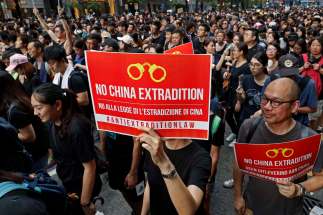Hong Kong protests produce dividends for resistance
Read this article for free:
or
Already have an account? Log in here »
To continue reading, please subscribe:
Monthly Digital Subscription
$0 for the first 4 weeks*
- Enjoy unlimited reading on winnipegfreepress.com
- Read the E-Edition, our digital replica newspaper
- Access News Break, our award-winning app
- Play interactive puzzles
*No charge for 4 weeks then price increases to the regular rate of $19.00 plus GST every four weeks. Offer available to new and qualified returning subscribers only. Cancel any time.
Monthly Digital Subscription
$4.75/week*
- Enjoy unlimited reading on winnipegfreepress.com
- Read the E-Edition, our digital replica newspaper
- Access News Break, our award-winning app
- Play interactive puzzles
*Billed as $19 plus GST every four weeks. Cancel any time.
To continue reading, please subscribe:
Add Free Press access to your Brandon Sun subscription for only an additional
$1 for the first 4 weeks*
*Your next subscription payment will increase by $1.00 and you will be charged $16.99 plus GST for four weeks. After four weeks, your payment will increase to $23.99 plus GST every four weeks.
Read unlimited articles for free today:
or
Already have an account? Log in here »
Hey there, time traveller!
This article was published 17/06/2019 (2367 days ago), so information in it may no longer be current.
Having blocked a proposed extradition law, leaders of the Hong Kong popular resistance movement on Monday called for the resignation of Carrie Lam, the Hong Kong chief executive who proposed the extradition law and then suspended work on it in the face of mass protests. Ms. Lam rules Hong Kong as a viceroy for Chinese President Xi Jinping, whose Hong Kong appointees put her in office.
Removal of Ms. Lam may also have crossed the minds of Mr. Xi and his Beijing colleagues since she failed to quell the street protests and failed to open the way for China’s government to demand extradition of Hong Kong people who openly criticize the Chinese Communist Party and who defend the freedoms Hong Kong residents currently enjoy. Her place might be taken by someone more willing to use brute force against street demonstrators.
Mr. Xi has to weigh the risk that mass demonstrations started in Hong Kong might spread to other Chinese cities. The risk is slight because news from Hong Kong is heavily censored by the Beijing authorities, because the Chinese police are constantly on the alert for political unrest and because the Mandarin-speaking people of northern China are often unsympathetic to complaints from the Cantonese-speaking people in and around Hong Kong.

But the Chinese Communist Party is extremely sensitive to disorder, as it showed in brutally suppressing the Tiananmen Square democracy movement 30 years ago.
At the same time, the rulers of China have to consider reactions in Taiwan. The Beijing government is eager to reunite Taiwan with China, promising special provisions to protect Taiwan’s capitalist system and democratic government. Heavy-handed action against Hong Kong would encourage Taiwanese who seek independence and would weaken those who seek closer ties with the mainland.
The extradition-law protests dramatically expressed the fear of Hong Kong people who feel the noose of Beijing control tightening around their necks. Ms. Lam and her colleagues underestimated the depth of that fear. Hong Kong is nearly midway through the 50-year period of special status promised to it when it returned under Chinese sovereignty in 1997. As the 2047 expiry of that promise looms closer, Hong Kong people — especially those under age 30 — are increasingly apprehensive about their prospects.
Canada has benefited greatly from trade with Hong Kong and Taiwan and immigration from the two territories. The longer their free-enterprise systems and democratic freedoms can be maintained, the better for Canada. The Beijing government is not listening to Canada these days, while the Meng Wanzhou extradition dispute continues, but this country has plenty of friends in Hong Kong and in Taiwan. Canada’s influence, such as it is, should support peaceful protest and defence of democratic values.
There is no merit in provoking China into brutal suppression of the Hong Kong resistance movement. There may be great merit in showing China and its people how deeply their Hong Kong and Taiwan neighbours fear and detest the political system that prevails on the mainland.

Ms. Lam serves at the pleasure of Mr. Xi. Her successor will do likewise. Ms. Lam at least showed the wisdom and flexibility to back away from a legislative measure that the territory’s people could not accept. The resistance movement should not try to throw her overboard until they are sure the next chief executive will suit them better.










